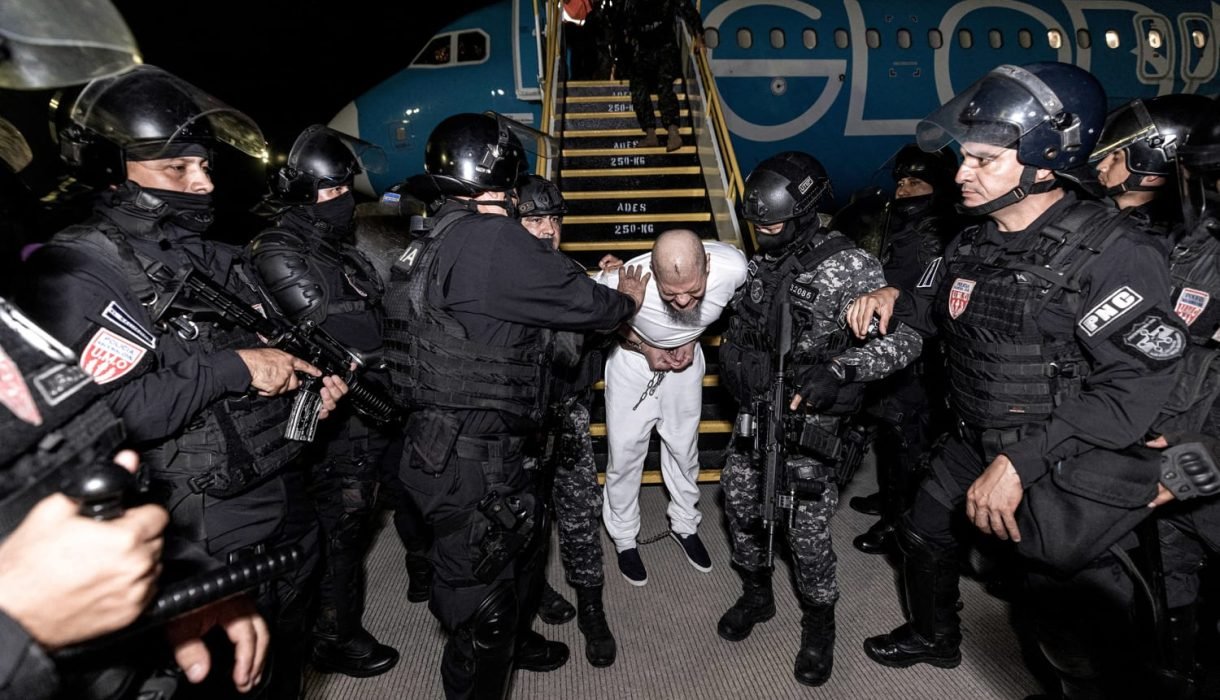
The Unfolding Controversy of Deportations under the Trump Administration
Deportation, Due Process, and the Alien Enemies Act: A Civil Liberties Crisis in the Making
It’s a murky political landscape when the thin line between national security and civil rights blurs. Growing up in a time when legal protections were taken seriously, the idea that an administration could potentially sidestep due process makes me uneasy. The recent actions under the Trump administration, particularly concerning the deportation of Venezuelan nationals, reflect a troubling trend that deserves our scrutiny. How could we, as a society, let this happen? Let’s dig into the details.
Understanding the Alien Enemies Act
A Historical Overview of the Law
The Alien Enemies Act was passed in 1798. It was a response to fears of foreign influence during a time of potential conflict. The law allows the government to detain or deport individuals from countries that are at war with the United States. This act was designed as a wartime measure, reflecting the anxieties of a young nation.
Fast forward to 1942, and we see the act in action again. During World War II, it was used to intern Japanese Americans. Many innocent people were caught up in this sweeping action, simply because of their heritage. This historical context raises questions about how we view the act today. Are we repeating past mistakes?
The Implications of Invoking This Act Today
Recently, the Alien Enemies Act has resurfaced in political discussions. The Trump administration claimed it justified the deportation of individuals associated with the Venezuelan gang, Tren Aaragua. This action has sparked significant controversy.
But what does this mean for us? Invoking a law from the 18th century in modern times is a bold move. It raises serious concerns about due process. Many of those deported were not given a fair chance to defend themselves. They were labeled as gang members based on superficial characteristics, like tattoos. Is this fair? Are we sacrificing justice for the sake of security?
As Judge James Boasberg pointed out, “
Invasion means war this also means the government not gangs.
” This statement highlights the complexity of using the Alien Enemies Act against non-state actors. It challenges the very definition of what constitutes an enemy in today’s world.
Comparison with Historical Instances of Its Use
When we look back at how the Alien Enemies Act was used during World War II, we see a troubling pattern. The internment of Japanese Americans was not just a violation of rights; it was a stain on our history. Today, we face similar challenges. The deportations of Venezuelan nationals have drawn criticism for their lack of due process.
- 1798: The Alien Enemies Act was enacted.
- 1942: The act was used against Japanese Americans.
- 2025: The act was invoked for deportations related to Venezuelan nationals.
These instances show a recurring theme. When fear takes hold, we often overlook the rights of individuals. The act, initially a tool for national security, can easily become a weapon against innocent people. Are we prepared to face the consequences of such actions?
As the legal battles unfold, we must consider the implications of these decisions. The deportations have raised questions about constitutional rights and the rule of law. Are we willing to sacrifice our values in the name of security?
In the coming weeks, we will likely see more developments in this case. The tension between judicial authority and executive power is palpable. As we navigate these complex issues, it’s essential to remember the lessons of history. We must strive to protect the rights of all individuals, regardless of their nationality.
The Alien Enemies Act serves as a reminder of how easily fear can lead to injustice. As we reflect on its implications today, let’s ask ourselves: How can we ensure that history does not repeat itself? How can we uphold our values while addressing legitimate security concerns?
The Trump Administration’s Approach to Deportations
The Trump administration’s approach to deportations has stirred significant controversy. It’s a complex issue that raises questions about legality, civil rights, and national security. Let’s break down some of the key elements.
Specific Incidents of Deportations
On March 16, 2025, the administration deported over 200 alleged members of the Venezuelan gang Tren Aaragua. This action was taken despite a federal judge’s order to halt such deportations. Many of these individuals were sent back to El Salvador without proper hearings. Can you imagine being forcibly removed from your home without a chance to defend yourself?
Reports indicate that some of those deported weren’t even gang members. Instead, they were labeled as such based on superficial characteristics, like tattoos. This raises serious concerns about the criteria used for these deportations. Are we really willing to sacrifice due process for the sake of expediency?
Claimed Associations with Gangs
The administration justified these deportations by claiming that these individuals were associated with gangs. But what does that really mean? The term “gang member” can be subjective. In this case, it seems to have been applied broadly and indiscriminately. Many deportees were simply seeking asylum or a better life.
As a result, the deportations have drawn significant criticism. Critics argue that the administration’s actions represent a dangerous precedent. They suggest that labeling individuals based on appearance or background could lead to widespread violations of civil rights. The question remains: how do we balance national security with individual rights?
Legal and Judicial Responses
In response to these deportations, five Venezuelan nationals filed a lawsuit against the administration. They argued that their imminent deportation was unconstitutional. According to them, the Alien Enemies Act, which the administration cited as justification, was meant to apply only during formal wars, not against non-state actors.
On March 15, 2025, just a day before the mass deportations began, these plaintiffs raised their voices in court. They claimed their Fifth Amendment rights were being violated. They argued that deportations without legal representation were a blatant disregard for due process. The urgency of their situation was palpable. They feared being removed before they could even file legal challenges.
Judge James Boasberg responded to their plea by granting a temporary restraining order (TRO). This order prevented the deportations of the plaintiffs for 14 days. The judge recognized that further deportations could cause irreparable harm. He emphasized that depriving individuals of their due process rights was unacceptable.
However, the administration’s legal team attempted to argue that their actions during deportation flights should not fall under the court’s jurisdiction. Judge Boasberg firmly rejected this notion. He reiterated that oral court orders carry significant weight. The administration was instructed to provide transparency regarding their actions.
“The Trump administration’s actions are an unprecedented challenge to the Constitution.”
This quote encapsulates the gravity of the situation. The administration’s legal representatives claimed that disclosing information about the deportations could jeopardize national security. Yet, they struggled to clarify whether the information was classified. This lack of transparency raises further questions about the administration’s motives.
As the legal battles continue, we find ourselves at a crossroads. The Trump administration’s approach to deportations challenges long-standing interpretations of immigration law and individual rights. The implications of these actions could shape the future of immigration policy in the United States.
In the midst of all this, I can’t help but wonder: what does this mean for the future of civil rights in our country? The ongoing legal challenges may hold the key to answering that question.
Impact on Civil Rights and Due Process
The recent deportation actions initiated by the Trump administration have raised significant concerns among civil rights advocates. These actions are not just legal maneuvers; they represent a profound challenge to the rights of individuals, particularly non-citizens. What does this mean for the future of civil rights in America? Are we witnessing a shift that could redefine how we view due process?
Concerns Raised by Civil Rights Advocates
Many civil rights organizations have voiced their alarm over the administration’s approach. They argue that the legal protections for non-citizens are being systematically undermined. This is a serious issue. The deportations, often justified under the Alien Enemies Act of 1798, have been criticized for lacking a foundation in due process.
- Deportations are occurring without proper hearings.
- Individuals are being labeled as gang members based on superficial characteristics.
- Many are being sent to detention centers without any evidence of wrongdoing.
These points highlight a troubling trend. The very essence of justice—fairness and the right to be heard—is at stake. As civil rights advocates put it, “This is going to be a historical black mark on this country…”
Testimonies of Affected Individuals
We cannot overlook the human stories behind these statistics. Individuals affected by these deportations have shared their experiences, shedding light on the harsh realities they face. Many of them came to the U.S. seeking safety and a better life. Instead, they find themselves trapped in a system that seems to disregard their rights.
Some individuals have reported being detained without access to legal representation. Imagine being taken from your home, labeled a criminal, and shipped off to a country where you fear for your life. This is not just a legal issue; it’s a moral one. The testimonies reveal a pattern of injustice that cannot be ignored.
The Role of the Judiciary in Safeguarding Rights
In the midst of this turmoil, the judiciary plays a crucial role. Judges have the power to uphold the Constitution and protect individual rights. For instance, Judge James Boasberg issued a temporary restraining order to halt deportations, recognizing the potential for irreparable harm. This action underscores the importance of judicial oversight in a system where executive power may overreach.
However, the administration’s response has raised eyebrows. They argue that their actions are necessary for national security. But at what cost? The judiciary must balance these claims against the fundamental rights guaranteed by the Constitution, particularly the 5th Amendment, which protects against deprivation of liberty without due process.
As we navigate this complex landscape, it’s essential to remember that the judiciary is not just a passive observer. It is an active participant in ensuring that justice prevails. The ongoing legal battles highlight the tension between the executive branch and the judiciary. This is a critical moment for civil rights in America.
In summary, the deportation actions taken by the Trump administration raise serious questions about civil rights and due process. The concerns voiced by advocates, the testimonies of those affected, and the judiciary’s role all intertwine to paint a picture of a system under strain. We must remain vigilant and engaged as these issues unfold, for they will shape the future of our legal landscape.
Rhetoric vs. Reality: The Narrative Surrounding Deportations
The topic of deportations is often clouded by a mix of rhetoric and reality. We hear a lot about it in the news, but how much of it reflects the true situation? The portrayal of deportees in the media, the political discourse surrounding crime and national security, and the public perception all play significant roles in shaping this narrative.
Media Portrayal of Deportees
Media outlets have a tendency to dramatize situations. This is particularly true when it comes to deportations. They often focus on sensational stories that grab attention. But what about the individuals behind these headlines? Are they accurately represented?
- Many deportees are labeled as criminals or gang members based on superficial characteristics.
- Reports indicate that some individuals were deported without any substantial evidence against them.
- Media narratives can create a stigma that affects public perception.
For instance, during the Trump administration, over 200 individuals were deported under allegations of gang affiliation. However, many of these individuals were not members of any gang. They were labeled based on things like tattoos or mere suspicion. This raises an important question: How can we trust a system that labels individuals without due process?
Political Discourse on Crime and National Security
Politicians often simplify complex issues to fit their narratives. They use deportations as a tool to discuss crime and national security. This can lead to a skewed understanding of the situation.
- Politicians may exploit fears about crime to justify harsh immigration policies.
- Claims of a state of war, like those made by the Trump administration regarding Venezuela, complicate the legal landscape.
- Using laws like the Alien Enemies Act of 1798 can be controversial and legally questionable.
When politicians label individuals as threats, it can create a climate of fear. This fear often overshadows the need for due process. As one legal expert noted,
“Absent evidence, labeling individuals without due process is dangerous.”
This statement underscores the risks involved in using rhetoric to justify actions that may violate individual rights.
Public Perception and Its Influences
Public perception is heavily influenced by media portrayals and political discourse. When the media sensationalizes deportations, it can lead to widespread fear and misunderstanding. This, in turn, affects how the public views immigrants and deportees.
- Negative portrayals can lead to increased hostility towards immigrant communities.
- Public opinion can sway political decisions, often in favor of stricter immigration policies.
- Misunderstandings about the legal rights of deportees can perpetuate injustice.
Many people may not realize that deportations often occur without proper hearings. Individuals seeking asylum can be removed without ever having their cases heard. This lack of transparency can lead to a significant erosion of trust in the system.
In the case of the Venezuelan nationals deported under questionable circumstances, we see how the narrative can overshadow the reality. Legal battles have emerged, highlighting the complexities of immigration law and the rights of individuals. As these cases unfold, it becomes clear that the rhetoric surrounding deportations often misses the nuance of individual cases.
We must ask ourselves: Are we allowing fear to dictate our understanding of immigration and deportations? The narrative is often one-sided, failing to capture the full spectrum of experiences faced by those affected.
As we continue to explore this topic, it’s essential to recognize the impact of media, politics, and public perception on the lives of individuals caught in the deportation process. The complexities of these situations deserve our attention and understanding.
Legal Challenges and the Path Forward
The current landscape of immigration law is fraught with tension. As we navigate through these turbulent waters, it’s essential to understand the legal challenges that are unfolding. The Trump administration is facing significant lawsuits regarding deportations, particularly those targeting individuals labeled as gang members. These deportations have raised serious questions about due process and civil liberties.
Current Lawsuits Challenging the Deportations
Five Venezuelan nationals have stepped forward, filing a lawsuit against the administration. They argue that their deportation is unconstitutional. They claim that the Alien Enemies Act, which the administration has cited, is misapplied. Historically, this law was intended for formal wars, not against non-state actors. The plaintiffs assert that their deportation without legal representation violates their Fifth Amendment rights. This legal battle is not just about these individuals; it represents a broader fight for justice and fairness in immigration practices.
In March 2025, a federal judge, James Boasberg, granted a temporary restraining order (TRO) that halted the deportations of the plaintiffs for 14 days. This decision acknowledged the potential for irreparable harm if these individuals were deported without due process. The judge’s ruling underscores the importance of judicial oversight in immigration matters. It reminds us that the courts play a crucial role in protecting civil liberties.
Potential Outcomes and Their Implications
The outcomes of these legal challenges could have far-reaching implications. If the courts rule in favor of the plaintiffs, it could set a precedent for future immigration cases. It may reinforce the necessity of due process and legal representation for all individuals facing deportation. On the other hand, if the administration prevails, it could embolden further actions that sidestep legal protections.
As we consider these potential outcomes, we must ask ourselves: what does this mean for the future of immigration in the United States? Will we see a shift towards more humane treatment of individuals facing deportation, or will we continue down a path of disregard for civil rights?
How Citizens Can Engage in Advocacy
Advocacy is a powerful tool in shaping policy. As citizens, we have a role to play. Here are some ways we can engage:
- Stay Informed: Knowledge is power. Follow the developments in these lawsuits and understand the implications of the rulings.
- Raise Awareness: Share information with your community. Use social media platforms to highlight the issues at stake.
- Contact Your Representatives: Let your elected officials know your stance on immigration and civil rights. Encourage them to support policies that protect due process.
- Join Advocacy Groups: Many organizations are working tirelessly to protect the rights of immigrants. Consider volunteering or donating to these causes.
As one concerned citizen aptly stated,
“We need to be vigilant about protecting our civil liberties.”
This sentiment resonates deeply in the current climate. It’s a reminder that our rights are not guaranteed; they must be actively defended.
As legal disputes continue, they highlight the ongoing tensions between national security and human rights. The administration’s actions raise critical questions about the balance of power in our democracy. The implications of these legal battles extend beyond individual cases; they touch on the very fabric of our society.
In conclusion, the legal challenges surrounding deportations are not merely about immigration policy. They are about our values as a nation. As we witness these unfolding events, we must remain engaged and informed. The outcomes of these lawsuits will shape the future of immigration law and individual rights in the United States. Let’s stand together in advocating for justice and due process for all.
TL;DR: The Trump administration’s use of the Alien Enemies Act to expedite deportations raises significant due process concerns, highlighting potential violations of civil rights and judicial authority.

